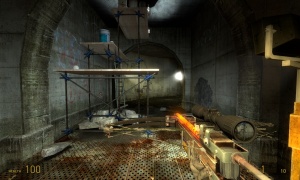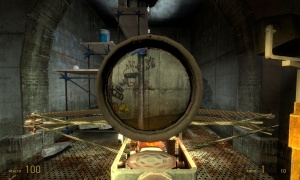Zh/Adding a Dynamic Scope: Difference between revisions
Huanglangran (talk | contribs) (Blanked the page) |
mNo edit summary |
||
| (7 intermediate revisions by 5 users not shown) | |||
| Line 1: | Line 1: | ||
{{LanguageBar|title = 添加动态狙击镜}} | |||
[[File:Dyscope rest.jpg|right|300px]] | |||
[[File:Dyscope aim.jpg|right|300px]] | |||
这篇文章会创建一个'''动态狙击镜''',它使用一个渲染目标的武器模型得出当前玩家的视角。这些代码可以运行在[[Episode One (engine branch)|半条命2:第一章]]的引擎,应该也可以在其他版本引擎工作。 | |||
{{note|1=此代码只能渲染模型,如果你想用此代码渲染其他地方(例如:渲染狙击镜的折射),[http://forums.steampowered.com/forums/showthread.php?t=1290970 渲染一个目标]。}} | |||
{{note|1=修改过的crossbow模型可以从这里[http://www.jordash.net/downloads/rt_crossbow.rar 下载]。}} | |||
==创建代码== | |||
首先创建两个文件分别命名为tne_RenderTargets.cpp和tne_RenderTargets.h,并添加到cl_dll项目,这些代码能够自定义渲染目标。此外,为了避免未知错误,baseclientrendertargts.cpp(及其头文件)需要添加到cl_dll项目。然而,其他版本的SDK都有这文件。 | |||
===tne_RenderTargets.cpp (新文件)=== | |||
<source lang=cpp>#include "cbase.h" | |||
#include "tne_RenderTargets.h" | |||
#include "materialsystem\imaterialsystem.h" | |||
#include "rendertexture.h" | |||
ITexture* CTNERenderTargets::CreateScopeTexture( IMaterialSystem* pMaterialSystem ) | |||
{ | |||
// DevMsg("Creating Scope Render Target: _rt_Scope\n"); | |||
return pMaterialSystem->CreateNamedRenderTargetTextureEx2( | |||
"_rt_Scope", | |||
1024, 1024, RT_SIZE_OFFSCREEN, | |||
pMaterialSystem->GetBackBufferFormat(), | |||
MATERIAL_RT_DEPTH_SHARED, | |||
TEXTUREFLAGS_CLAMPS | TEXTUREFLAGS_CLAMPT, | |||
CREATERENDERTARGETFLAGS_HDR ); | |||
} | |||
//----------------------------------------------------------------------------- | |||
// Purpose: Called by the engine in material system init and shutdown. | |||
// Clients should override this in their inherited version, but the base | |||
// is to init all standard render targets for use. | |||
// Input : pMaterialSystem - the engine's material system (our singleton is not yet inited at the time this is called) | |||
// pHardwareConfig - the user hardware config, useful for conditional render target setup | |||
//----------------------------------------------------------------------------- | |||
void CTNERenderTargets::InitClientRenderTargets( IMaterialSystem* pMaterialSystem, IMaterialSystemHardwareConfig* pHardwareConfig ) | |||
{ | |||
m_ScopeTexture.Init( CreateScopeTexture( pMaterialSystem ) ); | |||
// Water effects & camera from the base class (standard HL2 targets) | |||
BaseClass::InitClientRenderTargets( pMaterialSystem, pHardwareConfig ); | |||
} | |||
//----------------------------------------------------------------------------- | |||
// Purpose: Shut down each CTextureReference we created in InitClientRenderTargets. | |||
// Called by the engine in material system shutdown. | |||
// Input : - | |||
//----------------------------------------------------------------------------- | |||
void CTNERenderTargets::ShutdownClientRenderTargets() | |||
{ | |||
m_ScopeTexture.Shutdown(); | |||
// Clean up standard HL2 RTs (camera and water) | |||
BaseClass::ShutdownClientRenderTargets(); | |||
} | |||
//add the interface! | |||
static CTNERenderTargets g_TNERenderTargets; | |||
EXPOSE_SINGLE_INTERFACE_GLOBALVAR( CTNERenderTargets, IClientRenderTargets, CLIENTRENDERTARGETS_INTERFACE_VERSION, g_TNERenderTargets ); | |||
CTNERenderTargets* TNERenderTargets = &g_TNERenderTargets;</source> | |||
这段代码类似于CBaseClientRenderTargets。CreateScopeTexture()函数在引擎中被InitClientRenderTargets()函数呼应,为了初始化m_ScopeTexture(就是渲染目标贴图),他也呼应ShutdownClientRenderTargets()。 | |||
===tne_RenderTargets.h (新文件)=== | |||
<source lang=cpp>#ifndef TNERENDERTARGETS_H_ | |||
#define TNERENDERTARGETS_H_ | |||
#ifdef _WIN32 | |||
#pragma once | |||
#endif | |||
#include "baseclientrendertargets.h" // Base class, with interfaces called by engine and inherited members to init common render targets | |||
// externs | |||
class IMaterialSystem; | |||
class IMaterialSystemHardwareConfig; | |||
class CTNERenderTargets : public CBaseClientRenderTargets | |||
{ | |||
// no networked vars | |||
DECLARE_CLASS_GAMEROOT( CTNERenderTargets, CBaseClientRenderTargets ); | |||
public: | |||
virtual void InitClientRenderTargets( IMaterialSystem* pMaterialSystem, IMaterialSystemHardwareConfig* pHardwareConfig ); | |||
virtual void ShutdownClientRenderTargets(); | |||
ITexture* CreateScopeTexture( IMaterialSystem* pMaterialSystem ); | |||
private: | |||
CTextureReference m_ScopeTexture; | |||
}; | |||
extern CTNERenderTargets* TNERenderTargets; | |||
#endif //TNERENDERTARGETS_H_</source> | |||
这是头文件,它重写一个虚函数来自CBaseClientRenderTargets。 | |||
===rendertexture.cpp=== | |||
<source lang=cpp>static CTextureReference s_pScopeTexture; | |||
ITexture *GetScopeTexture( void ) | |||
{ | |||
if ( !s_pScopeTexture ) | |||
{ | |||
s_pScopeTexture.Init( materials->FindTexture( "_rt_Scope", TEXTURE_GROUP_RENDER_TARGET ) ); | |||
Assert( !IsErrorTexture( s_pScopeTexture ) ); | |||
AddReleaseFunc(); | |||
} | |||
return s_pScopeTexture; | |||
}</source> | |||
把这段代码放到GetCameraTexture函数附近,它的作用是返回渲染目标贴图。 | |||
===rendertexture.h=== | |||
<source lang=cpp>ITexture *GetScopeTexture();</source> | |||
把这行代码放到GetCameraTexture之后。 | |||
===view.cpp=== | |||
<source lang=cpp> | |||
void CViewRender::DrawScope( const CViewSetup &viewSet ) | |||
{ | |||
C_BasePlayer *localPlayer = C_BasePlayer::GetLocalPlayer(); | |||
if(!localPlayer) | |||
return; | |||
if( !localPlayer->GetActiveWeapon() ) | |||
return; | |||
if( !localPlayer->GetActiveWeapon()->GetViewModel() ) | |||
return; | |||
//Copy our current View. | |||
CViewSetup scopeView = viewSet; | |||
//Get our camera render target. | |||
ITexture *pRenderTarget = GetScopeTexture(); | |||
if( pRenderTarget == NULL ) | |||
return; | |||
if( !pRenderTarget->IsRenderTarget() ) | |||
Msg(" not a render target"); | |||
//Our view information, Origin, View Direction, window size | |||
// location on material, and visual ratios. | |||
scopeView.width = pRenderTarget->GetActualWidth(); | |||
scopeView.height = pRenderTarget->GetActualHeight(); | |||
scopeView.x = 0; | |||
scopeView.y = 0; | |||
scopeView.fov = localPlayer->GetActiveWeapon()->GetZoomFOV(); | |||
scopeView.m_bOrtho = false; | |||
scopeView.m_flAspectRatio = 1.0f; | |||
int nClearFlags = VIEW_CLEAR_DEPTH | VIEW_CLEAR_COLOR; | |||
bool bDrew3dSkybox = false; // bDrew3dSkybox = true turns the skybox OFF. DO NOT SET IT TO TRUE. | |||
bool bSkyboxVisible = true; | |||
//Set the view up and output the scene to our RenderTarget (Scope Material). | |||
render->Push3DView( scopeView, VIEW_CLEAR_DEPTH | VIEW_CLEAR_COLOR, true, pRenderTarget, m_Frustum ); | |||
Draw3dSkyboxworld( scopeView, nClearFlags, bDrew3dSkybox, bSkyboxVisible); | |||
ViewDrawScene( bDrew3dSkybox, bSkyboxVisible, scopeView, 0, VIEW_MONITOR ); | |||
render->PopView( m_Frustum ); | |||
}</source> | |||
这段代码有点像DrawCamera,基本上,它复制当前的视角,分配渲染目标到贴图,然后设置一些基本属性给scopeView例如高度、宽度、位置等等,FOV在这里参考了武器脚本的值。 | |||
===viewrender.h=== | |||
<source lang=cpp>void DrawScope( const CViewSetup &cameraView );</source> | |||
把这行代码放在DrawCamera之后。 | |||
===view_scene.cpp=== | |||
<source lang=cpp>//Draw the scope too | |||
if(g_pMaterialSystemHardwareConfig->GetDXSupportLevel() >= 70 ) | |||
{ | |||
DrawScope( view ); | |||
}</source> | |||
如果你是DirectX 7的显卡它的作用是切出瞄准镜,把这段代码放到RenderViewEx(),在#ifdef USE_MONITORS #endif这块代码之前。 | |||
==vmt文件== | |||
创建一个新的vmt文件来创建贴图,并用它来与相关的武器对应。把以下文字放到此文件: | |||
UnlitGeneric | |||
{ | |||
$basetexture _rt_Scope | |||
$model 1 | |||
} | |||
它创建_rt_Scope贴图并应用于可用的武器,然后把_rt_Scope放到你的武器模型! | |||
== 半条命第二章引擎文件修复 == | |||
=== viewrender.cpp === | |||
在viewrender.cpp文件,在DrawMonitors之后,更换DrawScope函数,代替view.cpp。 | |||
更换: | |||
<source lang=cpp> | |||
int nClearFlags = VIEW_CLEAR_DEPTH | VIEW_CLEAR_COLOR; | |||
bool bDrew3dSkybox = false; // bDrew3dSkybox = true turns the skybox OFF. DO NOT SET IT TO TRUE. | |||
bool bSkyboxVisible = true; | |||
//Set the view up and output the scene to our RenderTarget (Scope Material). | |||
render->Push3DView( scopeView, VIEW_CLEAR_DEPTH | VIEW_CLEAR_COLOR, true, pRenderTarget, m_Frustum ); | |||
Draw3dSkyboxworld( scopeView, nClearFlags, bDrew3dSkybox, bSkyboxVisible); | |||
ViewDrawScene( bDrew3dSkybox, bSkyboxVisible, scopeView, 0, VIEW_MONITOR ); | |||
render->PopView( m_Frustum ); | |||
</source> | |||
到: | |||
<source lang=cpp> | |||
//Set the view up and output the scene to our RenderTarget (Scope Material). | |||
render->Push3DView( scopeView, VIEW_CLEAR_DEPTH | VIEW_CLEAR_COLOR, pRenderTarget, GetFrustum() ); | |||
SkyboxVisibility_t nSkyboxVisible = SKYBOX_NOT_VISIBLE; | |||
int ClearFlags = 0; | |||
CSkyboxView *pSkyView = new CSkyboxView( this ); | |||
if( pSkyView->Setup( scopeView, &ClearFlags, &nSkyboxVisible ) != false ) | |||
AddViewToScene( pSkyView ); | |||
SafeRelease( pSkyView ); | |||
ViewDrawScene( false, SKYBOX_3DSKYBOX_VISIBLE, scopeView, VIEW_CLEAR_DEPTH, VIEW_MONITOR ); | |||
render->PopView( m_Frustum ); | |||
</source> | |||
更换: | |||
<source lang=cpp>scopeView.fov = localPlayer->GetActiveWeapon()->GetZoomFOV();</source> | |||
到 | |||
<source lang=cpp>scopeView.fov = 45;</source> | |||
(GetZoomFOV()不是默认浮点函数,它需要C_BaseCombatWeapon的命令才能工作。) | |||
更换viewrender.cpp的末尾'''CViewRender::RenderView''' | |||
<source lang=cpp> | |||
if(g_pMaterialSystemHardwareConfig->GetDXSupportLevel() >= 70 ) | |||
{ | |||
DrawScope( view ); | |||
} | |||
</source> | |||
右上方 | |||
<source lang=cpp> | |||
render->PopView( GetFrustum() ); | |||
g_WorldListCache.Flush(); | |||
</source> | |||
view_scene.cpp | |||
现在动态狙击镜可以在半条命第二章引擎工作了。 | |||
{{ACategory|Weapons programming}} | |||
{{ACategory|Tutorials}} | |||
Latest revision as of 08:07, 9 October 2025
这篇文章会创建一个动态狙击镜,它使用一个渲染目标的武器模型得出当前玩家的视角。这些代码可以运行在半条命2:第一章的引擎,应该也可以在其他版本引擎工作。
创建代码
首先创建两个文件分别命名为tne_RenderTargets.cpp和tne_RenderTargets.h,并添加到cl_dll项目,这些代码能够自定义渲染目标。此外,为了避免未知错误,baseclientrendertargts.cpp(及其头文件)需要添加到cl_dll项目。然而,其他版本的SDK都有这文件。
tne_RenderTargets.cpp (新文件)
#include "cbase.h"
#include "tne_RenderTargets.h"
#include "materialsystem\imaterialsystem.h"
#include "rendertexture.h"
ITexture* CTNERenderTargets::CreateScopeTexture( IMaterialSystem* pMaterialSystem )
{
// DevMsg("Creating Scope Render Target: _rt_Scope\n");
return pMaterialSystem->CreateNamedRenderTargetTextureEx2(
"_rt_Scope",
1024, 1024, RT_SIZE_OFFSCREEN,
pMaterialSystem->GetBackBufferFormat(),
MATERIAL_RT_DEPTH_SHARED,
TEXTUREFLAGS_CLAMPS | TEXTUREFLAGS_CLAMPT,
CREATERENDERTARGETFLAGS_HDR );
}
//-----------------------------------------------------------------------------
// Purpose: Called by the engine in material system init and shutdown.
// Clients should override this in their inherited version, but the base
// is to init all standard render targets for use.
// Input : pMaterialSystem - the engine's material system (our singleton is not yet inited at the time this is called)
// pHardwareConfig - the user hardware config, useful for conditional render target setup
//-----------------------------------------------------------------------------
void CTNERenderTargets::InitClientRenderTargets( IMaterialSystem* pMaterialSystem, IMaterialSystemHardwareConfig* pHardwareConfig )
{
m_ScopeTexture.Init( CreateScopeTexture( pMaterialSystem ) );
// Water effects & camera from the base class (standard HL2 targets)
BaseClass::InitClientRenderTargets( pMaterialSystem, pHardwareConfig );
}
//-----------------------------------------------------------------------------
// Purpose: Shut down each CTextureReference we created in InitClientRenderTargets.
// Called by the engine in material system shutdown.
// Input : -
//-----------------------------------------------------------------------------
void CTNERenderTargets::ShutdownClientRenderTargets()
{
m_ScopeTexture.Shutdown();
// Clean up standard HL2 RTs (camera and water)
BaseClass::ShutdownClientRenderTargets();
}
//add the interface!
static CTNERenderTargets g_TNERenderTargets;
EXPOSE_SINGLE_INTERFACE_GLOBALVAR( CTNERenderTargets, IClientRenderTargets, CLIENTRENDERTARGETS_INTERFACE_VERSION, g_TNERenderTargets );
CTNERenderTargets* TNERenderTargets = &g_TNERenderTargets;
这段代码类似于CBaseClientRenderTargets。CreateScopeTexture()函数在引擎中被InitClientRenderTargets()函数呼应,为了初始化m_ScopeTexture(就是渲染目标贴图),他也呼应ShutdownClientRenderTargets()。
tne_RenderTargets.h (新文件)
#ifndef TNERENDERTARGETS_H_
#define TNERENDERTARGETS_H_
#ifdef _WIN32
#pragma once
#endif
#include "baseclientrendertargets.h" // Base class, with interfaces called by engine and inherited members to init common render targets
// externs
class IMaterialSystem;
class IMaterialSystemHardwareConfig;
class CTNERenderTargets : public CBaseClientRenderTargets
{
// no networked vars
DECLARE_CLASS_GAMEROOT( CTNERenderTargets, CBaseClientRenderTargets );
public:
virtual void InitClientRenderTargets( IMaterialSystem* pMaterialSystem, IMaterialSystemHardwareConfig* pHardwareConfig );
virtual void ShutdownClientRenderTargets();
ITexture* CreateScopeTexture( IMaterialSystem* pMaterialSystem );
private:
CTextureReference m_ScopeTexture;
};
extern CTNERenderTargets* TNERenderTargets;
#endif //TNERENDERTARGETS_H_
这是头文件,它重写一个虚函数来自CBaseClientRenderTargets。
rendertexture.cpp
static CTextureReference s_pScopeTexture;
ITexture *GetScopeTexture( void )
{
if ( !s_pScopeTexture )
{
s_pScopeTexture.Init( materials->FindTexture( "_rt_Scope", TEXTURE_GROUP_RENDER_TARGET ) );
Assert( !IsErrorTexture( s_pScopeTexture ) );
AddReleaseFunc();
}
return s_pScopeTexture;
}
把这段代码放到GetCameraTexture函数附近,它的作用是返回渲染目标贴图。
rendertexture.h
ITexture *GetScopeTexture();
把这行代码放到GetCameraTexture之后。
view.cpp
void CViewRender::DrawScope( const CViewSetup &viewSet )
{
C_BasePlayer *localPlayer = C_BasePlayer::GetLocalPlayer();
if(!localPlayer)
return;
if( !localPlayer->GetActiveWeapon() )
return;
if( !localPlayer->GetActiveWeapon()->GetViewModel() )
return;
//Copy our current View.
CViewSetup scopeView = viewSet;
//Get our camera render target.
ITexture *pRenderTarget = GetScopeTexture();
if( pRenderTarget == NULL )
return;
if( !pRenderTarget->IsRenderTarget() )
Msg(" not a render target");
//Our view information, Origin, View Direction, window size
// location on material, and visual ratios.
scopeView.width = pRenderTarget->GetActualWidth();
scopeView.height = pRenderTarget->GetActualHeight();
scopeView.x = 0;
scopeView.y = 0;
scopeView.fov = localPlayer->GetActiveWeapon()->GetZoomFOV();
scopeView.m_bOrtho = false;
scopeView.m_flAspectRatio = 1.0f;
int nClearFlags = VIEW_CLEAR_DEPTH | VIEW_CLEAR_COLOR;
bool bDrew3dSkybox = false; // bDrew3dSkybox = true turns the skybox OFF. DO NOT SET IT TO TRUE.
bool bSkyboxVisible = true;
//Set the view up and output the scene to our RenderTarget (Scope Material).
render->Push3DView( scopeView, VIEW_CLEAR_DEPTH | VIEW_CLEAR_COLOR, true, pRenderTarget, m_Frustum );
Draw3dSkyboxworld( scopeView, nClearFlags, bDrew3dSkybox, bSkyboxVisible);
ViewDrawScene( bDrew3dSkybox, bSkyboxVisible, scopeView, 0, VIEW_MONITOR );
render->PopView( m_Frustum );
}
这段代码有点像DrawCamera,基本上,它复制当前的视角,分配渲染目标到贴图,然后设置一些基本属性给scopeView例如高度、宽度、位置等等,FOV在这里参考了武器脚本的值。
viewrender.h
void DrawScope( const CViewSetup &cameraView );
把这行代码放在DrawCamera之后。
view_scene.cpp
//Draw the scope too
if(g_pMaterialSystemHardwareConfig->GetDXSupportLevel() >= 70 )
{
DrawScope( view );
}
如果你是DirectX 7的显卡它的作用是切出瞄准镜,把这段代码放到RenderViewEx(),在#ifdef USE_MONITORS #endif这块代码之前。
vmt文件
创建一个新的vmt文件来创建贴图,并用它来与相关的武器对应。把以下文字放到此文件:
UnlitGeneric { $basetexture _rt_Scope $model 1 }
它创建_rt_Scope贴图并应用于可用的武器,然后把_rt_Scope放到你的武器模型!
半条命第二章引擎文件修复
viewrender.cpp
在viewrender.cpp文件,在DrawMonitors之后,更换DrawScope函数,代替view.cpp。
更换:
int nClearFlags = VIEW_CLEAR_DEPTH | VIEW_CLEAR_COLOR;
bool bDrew3dSkybox = false; // bDrew3dSkybox = true turns the skybox OFF. DO NOT SET IT TO TRUE.
bool bSkyboxVisible = true;
//Set the view up and output the scene to our RenderTarget (Scope Material).
render->Push3DView( scopeView, VIEW_CLEAR_DEPTH | VIEW_CLEAR_COLOR, true, pRenderTarget, m_Frustum );
Draw3dSkyboxworld( scopeView, nClearFlags, bDrew3dSkybox, bSkyboxVisible);
ViewDrawScene( bDrew3dSkybox, bSkyboxVisible, scopeView, 0, VIEW_MONITOR );
render->PopView( m_Frustum );
到:
//Set the view up and output the scene to our RenderTarget (Scope Material).
render->Push3DView( scopeView, VIEW_CLEAR_DEPTH | VIEW_CLEAR_COLOR, pRenderTarget, GetFrustum() );
SkyboxVisibility_t nSkyboxVisible = SKYBOX_NOT_VISIBLE;
int ClearFlags = 0;
CSkyboxView *pSkyView = new CSkyboxView( this );
if( pSkyView->Setup( scopeView, &ClearFlags, &nSkyboxVisible ) != false )
AddViewToScene( pSkyView );
SafeRelease( pSkyView );
ViewDrawScene( false, SKYBOX_3DSKYBOX_VISIBLE, scopeView, VIEW_CLEAR_DEPTH, VIEW_MONITOR );
render->PopView( m_Frustum );
更换:
scopeView.fov = localPlayer->GetActiveWeapon()->GetZoomFOV();
到
scopeView.fov = 45;
(GetZoomFOV()不是默认浮点函数,它需要C_BaseCombatWeapon的命令才能工作。)
更换viewrender.cpp的末尾CViewRender::RenderView
if(g_pMaterialSystemHardwareConfig->GetDXSupportLevel() >= 70 )
{
DrawScope( view );
}
右上方
render->PopView( GetFrustum() );
g_WorldListCache.Flush();
view_scene.cpp
现在动态狙击镜可以在半条命第二章引擎工作了。

